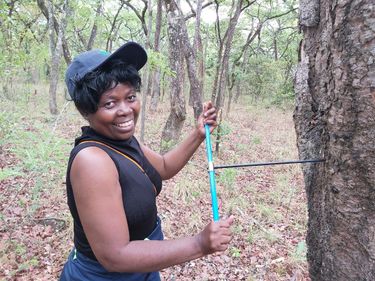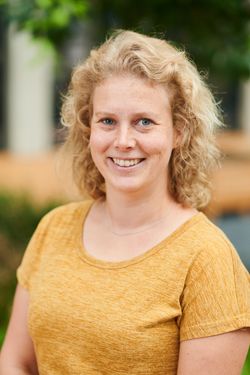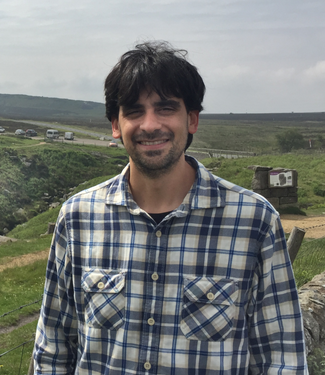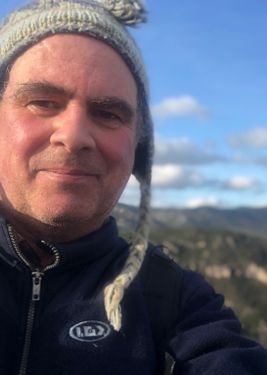
Sessions in which Kelsey Copes-Gerbitz participates
Tuesday 28 June, 2022
Indigenous land stewardship and mixed-severity fire regimes both encourage landscape heterogeneity and the relationship between them is an emerging area of research. To contribute to this exploration, we reconstructed the historical fire regime of Ne Sextsine, a 6000-ha dry, Douglas-fir-dominated forest in the traditional territory of the T’exelc (Williams Lake First Nation) in British Columbia. Between 1550 and 1982 CE, we found median fire intervals of 15 years at the plot-level and 4 ye...
Wednesday 29 June, 2022
Session reescheduled from June 28th to June 29th
Indigenous land stewardship and mixed-severity fire regimes both encourage landscape heterogeneity and the relationship between them is an emerging area of research. To contribute to this exploration, we reconstructed the historical fire regime of Ne Sextsine, a 6000-ha dry, Douglas-fir-dominated forest in the traditional territory of the T’exelc (Williams Lake First Nation) in British Columbia. Between 1550 and 1982 CE, we found median fire intervals of 15 years at the plot-level and 4 ye...
Thursday 30 June, 2022
Allies have emerged as key enablers of diversity and inclusivity initiatives in the workplace, in professional associations, and in everyday life. But what is an ally? What skills are required to be an effective ally? How do we hold ourselves and our community members accountable for being effective allies? This symposium will provide a deeper understanding of what it means to be an ally and the skills to help advance allyship as individuals and as a community. Fur...
Sessions in which Kelsey Copes-Gerbitz attends
Tuesday 28 June, 2022
Africa is faced with a number of challenges including climate change and ecological disturbance due to various anthropogenic activities. These problems adversely affect the forests and also ecosystem services. My appreciation for the forests motivated me to pursure my undergraduate studies in Forestry. I first applied dendrochronology during my PhD research which focused on understanding the climate change vulnerability of the Zambezi teak forests in Zambia. However, lack of research facil...
As of 2020, 56% of the world’s population live in urban areas. These individuals benefit from numerous ecosystem services provided by urban forests, including urban heat island mitigation, energy use reduction, stormwater interception, wildlife and pollinator habitat provision, air pollution removal, and carbon sequestration. Urban greenspaces are also often the most accessible avenue for exposure to the natural environment, providing additional aesthetic, recreati...
Wednesday 29 June, 2022
Dendrochronology is considered one the most precise of all the scientific dating techniques. However, it requires long sequences of tree rings and a master record for both the species and region in question. At the University of Groningen, we have been pioneering a new approach to dating that combines the precision of dendrochronology with the versatility of radiocarbon dating. It relies on the detection of spikes in the annual radiocarbon record, thought to b...
Information garnered from historical timbers and wooden artifacts (e.g. houses, barns, ships) can greatly enhance our understanding of human, ecological, and climate history, especially in regions where few old-growth forests and trees remain, tree longevity is relatively short (less than 300-400 years), and environmental conditions break down wood rather quickly, like in mesic to wet regions. Over the last decade plus, the application of tree-ring techniques on wo...
Information garnered from historical timbers and wooden artifacts (e.g. houses, barns, ships) can greatly enhance our understanding of human, ecological, and climate history, especially in regions where few old-growth forests and trees remain, tree longevity is relatively short (less than 300-400 years), and environmental conditions break down wood rather quickly, like in mesic to wet regions Over the last decade plus, the application of tree-ring techniques on woo...
Presentation of all Ameridendro2022 posters.FREE LUNCH FOR ALL ATTENDEES!
This is a mandatory (!) .... and FREE (!!) cocktail & award ceremony (!!!)(in replacement of the Banquet formula)->->->->->->->->->->->->->->->->->->After a great summer day of scientific and urban discoveries in our beloved MTL, we wish to bring together all the AmeriDendro community in one place and congratulate the TRS awardees for their remarkable achievements! -Bonsinsegna award-Fr...
Thursday 30 June, 2022
How old are tropical trees? This fundamental question has long driven the curiosity of laymen and scientists. But only recently, a great number of studies conducted by many brave dendrochronologists resulted in a significant tree-ring-based knowledge that allows us to start accurately estimating tree ages across the globe. As science goes, not only knowing the longevity of tropical trees is essential to understanding forest dynamics and its role in biogeochemical cycles, but one must also ...
Dendrochronological archives in the tropics of the Americas have been under-studied for a long time. Some of the challenges include the Identification of tree-ring boundaries in certain tree species, absence of winter dormancy associated to low temperatures in most of the cases, and logistic difficulties of fieldwork in remote sites. However, part of the slow progress is also related to the fact that historically much less resources have been inv...
Dendrochronological archives in the tropics of the Americas have been under-studied for a long time. Some of the challenges include the Identification of tree-ring boundaries in certain tree species, absence of winter dormancy associated to low temperatures in most of the cases, and logistic difficulties of fieldwork in remote sites. However, part of the slow progress is also related to the fact that historically much less resources have been inv...
A gap of millennial tree-ring data suitable for dendroclimatology has long been evident in the North American boreal forest. In my talk, I will describe the adaptive approach we have developed to build and improve a data network for millennial dendroclimatology in the eastern Canadian taiga. Recurrence of stand replacing wildfires is the most important constrain to the elaboration of long tree ring chronologies, which can only be developed away from regions ...




